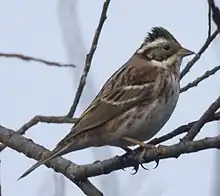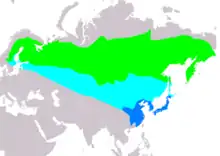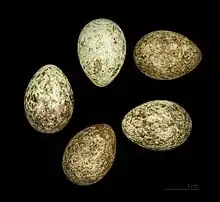| Rustic bunting | |
|---|---|
 | |
| Scientific classification | |
| Domain: | Eukaryota |
| Kingdom: | Animalia |
| Phylum: | Chordata |
| Class: | Aves |
| Order: | Passeriformes |
| Family: | Emberizidae |
| Genus: | Emberiza |
| Species: | E. rustica |
| Binomial name | |
| Emberiza rustica Pallas, 1776 | |
 | |
| Range of E. rustica Breeding Passage Non-breeding | |

The rustic bunting (Emberiza rustica) is a passerine bird in the bunting family Emberizidae, a group now separated by most modern authors from the finches, Fringillidae. The genus name Emberiza is from Old German Embritz, a bunting. The specific rustica is Latin for "rustic, simple".[2]
It breeds across the northern Palearctic. It is migratory, wintering in south-east Asia, Japan, Korea, and eastern China. It is a rare wanderer to western Europe.
It breeds in wet coniferous woodland. Four to six eggs are laid in a nest in a bush or on the ground. Its natural food consists of seeds, and when feeding young, insects.
This bird is similar in size to a reed bunting. It has white underparts with reddish flank, pink legs and a pink lower mandible. The summer male has a black head with a white throat and supercilium and a reddish breast band.
The female has a heavily streaked brown back and brown face with a whitish supercilium. She resembles a female reed bunting, but has the reddish flank streaks, a chestnut nape and a pink, not grey, lower mandible.
The call is a distinctive zit, and the song is a melancholic delee-deloo-delee.
References
- ↑ BirdLife International (2016). "Emberiza rustica". IUCN Red List of Threatened Species. 2016: e.T22720960A89641304. doi:10.2305/IUCN.UK.2016-3.RLTS.T22720960A89641304.en. Retrieved 12 November 2021.
- ↑ Jobling, James A. (2010). The Helm Dictionary of Scientific Bird Names. London, United Kingdom: Christopher Helm. pp. 145, 344. ISBN 978-1-4081-2501-4.
External links
- OBC 11 photographs (see pulldown menu at page bottom)
